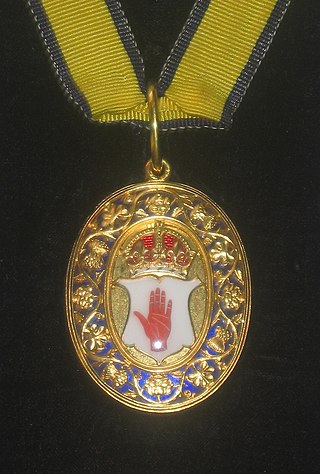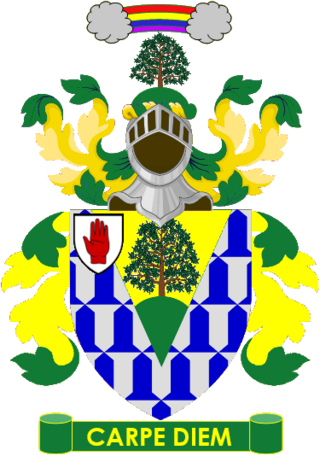
A baronet or the female equivalent, a baronetess, is the holder of a baronetcy, a hereditary title awarded by the British Crown. The title of baronet is mentioned as early as the 14th century; however, in its current usage it was created by James I of England in 1611 as a means of raising funds for the crown.

Viscount Brentford, of Newick in the County of Sussex, is a title in the Peerage of the United Kingdom. It was created in 1929 for the Conservative politician Sir William Joynson-Hicks, 1st Baronet, chiefly remembered for his tenure as Home Secretary from 1924 to 1929. He had already been created a baronet, of Holmsbury, in the Baronetage of the United Kingdom, on 20 September 1919. His younger son, the third Viscount, was also a Conservative politician. On 29 January 1956, two years before he succeeded his elder brother in the viscountcy, he was created a baronet, of Newick. As of 2022 the titles are held by the third Viscount's son, the fourth Viscount, who succeeded in 1983, a retired solicitor and has served as the president of the Church Society.

Baron Hazlerigg, of Noseley in the County of Leicester, is a title in the Peerage of the United Kingdom. It was created in 1945 for Sir Arthur Hazlerigg, 13th Baronet. He had previously served as Lord Lieutenant of Leicestershire. As of 2023 the title is held by his great-grandson, the fourth Baron, who succeeded his father in 2022.

Baron St Levan, of St Michael's Mount in the County of Cornwall, is a title in the Peerage of the United Kingdom. It was created on 4 July 1887 for the former Member of Parliament Sir John St Aubyn, 2nd Baronet, becoming John St Aubyn, 1st Baron St Levan. He had previously represented Cornwall West in House of Commons as a Liberal and St Ives as a Liberal Unionist. He was succeeded by his eldest son, the second Baron, who was a Colonel and Honorary Brigadier-General in the Grenadier Guards. On his death the titles passed to his nephew, the third Baron, the son of the Hon. Sir Arthur James Dudley Stuart St Aubyn (1867–1897), second son of the first Baron. The third baron was succeeded in 1978 by his eldest son, the fourth baron, who had served with the Royal Navy at Dunkirk and in a minesweeper in Arctic Convoys during World War II and was awarded the Distinguished Service Cross (DSC). As of 2014, the titles are held by the fourth Baron's nephew, the fifth Baron, who succeeded in 2013.
Baron Greenway, of Stanbridge Earls in the County of Southampton, is a title in the Peerage of the United Kingdom. It was created in 1927 for Sir Charles Greenway, 1st Baronet, one of the founders of the Anglo-Persian Oil Company. He had already been created a Baronet, of Stanbridge Earls in the County of Southampton, in 1919. As of 2017 the titles are held by his great-grandson, the fourth Baron, who succeeded his father in 1975. Lord Greenway is one of the ninety elected hereditary peers that remain in the House of Lords after the passing of the House of Lords Act 1999, and sits as a cross-bencher.
There have been three baronetcies created for members of the Anstruther family, two in the Baronetage of Nova Scotia and one in the Baronetage of Great Britain. Two of the creations are extant while one is extinct.

The Wigan Baronetcy, of Clare Lawn in Mortlake in the County of Surrey and Purland Chase in Ross in the County of Hereford, is a title in the Baronetage of the United Kingdom. It was created on 9 March 1898 for Frederick Wigan, a Director of the North London Railway. The presumed 6th Baronet, listed in Debrett's Peerage (2015) as the son of the 5th Baronet, has not successfully proven his succession and is consequently not on the Official Roll of the Baronetage.

There have been two baronetcies created for members of the Trevelyan family, one in the Baronetage of England and one in the Baronetage of the United Kingdom. As of 2014, both creations are extant.

There have been four Baronetcies created for persons with the surname Harris, two in the Baronetage of England and two in the Baronetage of the United Kingdom. One creation is extant as of 2010.
There have been three baronetcies created for members of the Gore family, all in the Baronetage of Ireland. All three titles are extant. The family also holds two earldoms and a barony.
There have been two baronetcies created for the Onslow family, one in the Baronetage of England and one in the Baronetage of Great Britain. Both titles are extant.
There have been nine baronetcies created for persons with the surname Moore, two in the Baronetage of England, one in the Baronetage of Ireland, two in the Baronetage of Great Britain and four in the Baronetage of the United Kingdom. As of 2014 two creations are extant and one is considered dormant.
There have been two baronetcies created for persons with the surname Fuller, one in the Baronetage of England and one in the Baronetage of the United Kingdom. One creation is extant as of 2010.

There have been two baronetcies created for members of the St Aubyn family, one in the Baronetage of England and one in the Baronetage of the United Kingdom.
There have been four baronetcies created for persons with the surname O'Brien, one in the Baronetage of Ireland and three in the Baronetage of the United Kingdom.
There have been two baronetcies created for members of the Wolseley family, one in the Baronetage of England and one in the Baronetage of Ireland. As of 2018, the Wolseley Baronetcy of Mount Wolseley is dormant.

The Neave Baronetcy, of Dagnam Park in the County of Essex, is a title in the Baronetage of Great Britain. It was created on 13 May 1795 for Richard Neave, Governor of the Bank of England from 1783 to 1785. Dorina Neave (1880–1955), wife of Sir Thomas, was the author of three books about Turkey. She settled with her husband at Dagnam Park and was the last of the family to live there before its requisition in the winter of 1940 and eventual demolition in 1950.
There have been three baronetcies created for persons with the surname Paul, one in the Baronetage of Great Britain, one in the Baronetage of Ireland and one in the Baronetage of the United Kingdom. All three creations are extinct.

Earl of Arran is a title in the Peerage of Ireland. It is not to be confused with the title Earl of Arran in the Peerage of Scotland. The two titles refer to different places: the Aran Islands in Ireland, and the Isle of Arran in Scotland. The Irish earldom is held by the Gore family. The Scottish earldom is a separate title, held as a subsidiary title of the Duke of Hamilton.